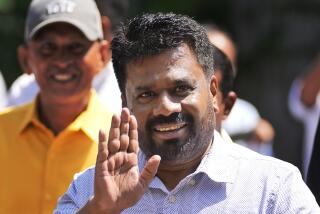ANC Leaving Rivals in the Dust
- Share via
JOHANNESBURG, South Africa — The African National Congress government was headed Thursday for a landslide victory in parliamentary elections, its best result since the end of apartheid, despite high unemployment, poverty and an AIDS crisis.
With more than three-quarters of the vote counted, the ANC was edging close to 70% of the vote, well above its support in 1994 when voters swept the white minority government away in the nation’s first all-race elections. In that poll the ANC won 63%.
The ANC was confident of getting the two-thirds majority in Parliament that would enable the party to change the constitution at will.
The party was planning a celebration today, not in the heart of the black South African communities but in the suburb of Sandton, north of Johannesburg, a privileged area dominated by white enclaves and gated, security-conscious communities.
The ANC victory was seen as a result of disciplined organization and a branch structure that eclipses that of other parties. Although President Thabo Mbeki is widely viewed as lacking the charisma of his predecessor, Nelson Mandela, he made an effort during the campaign to tour impoverished areas and overcome his image as a distant and wooden intellectual leader.
The Democratic Alliance, led by Tony Leon, a predominantly white party with some black members, had the second-highest share of votes as of Thursday. The party had nearly 14% of the ballots, well above its 9.5% total in national elections five years ago, making it the most credible opposition party.
As votes rolled in Thursday, the ANC continued to pull further ahead of opposition parties.
A poll of 3,500 people published today by Markinor, an independent research company, found that 92% of respondents identified as ANC voters cast their ballots for the party because of its role in ending white rule a decade ago more than for its present or anticipated conduct.
Despite joblessness and poverty, the ANC drew wide backing among poorer citizens. The party received 80% of the vote in one of the poorest provinces, the Eastern Cape, where unemployment is estimated at 55% and many rural households lack basic services.
ANC officials crowed Thursday about the nationwide results. “The hurricane is beginning to blow, and it’s blowing in our favor,” said ANC spokesman Smuts Ngonyama.
The Star daily newspaper trumpeted the headline “Two Horse Race,” reflecting the increased support for the Democratic Alliance. But the ANC’s huge majority rang alarm bells elsewhere.
Former President Frederik W. de Klerk, whose National Party ruled during apartheid but helped usher in the end of white rule, said the result was not good news for South Africa’s developing democracy.
“It already seems clear we are still caught up in the logjams of the past,” De Klerk said. “The ANC still wields more power than is healthy in a democracy. Voting patterns have once again been influenced far too much by race and ethnicity.”
The Markinor poll found that 55% of South Africans thought a strong opposition was necessary to keep the ruling party on its toes. Nonetheless, the New National Party, heir to the apartheid-era governing party, lost support: down to less than 2%, from 7% in the last election.
Mbeki’s standing was enhanced by the results, though he has ruled out seeking a change in the constitution to enable him to run for a third term.
Mbeki has been widely criticized in South Africa and internationally for responding too slowly to the country’s AIDS crisis. About 5 million South African are estimated to be HIV-positive, and free antiretroviral drugs that can treat the virus were made available only in one province just two weeks before the poll.
In two key provinces, Western Cape and KwaZulu-Natal, the ANC was battling opposition parties.
Leon, the Democratic Alliance leader, said he expected to govern KwaZulu-Natal in a coalition with the Inkatha Freedom Party. In the Western Cape, the ANC had less than 50%, with final results unclear.
Though a final count was not available Thursday, preliminary numbers suggested that voter turnout was about 74%, down from 89% during the 1999 elections.
More to Read
Sign up for Essential California
The most important California stories and recommendations in your inbox every morning.
You may occasionally receive promotional content from the Los Angeles Times.













